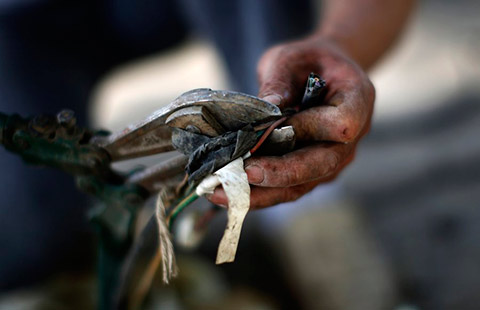Surge in illegal fundraising cases and amounts in 2014
By JIANG XUEQING (China Daily) Updated: 2015-04-29 09:50Illegal fundraising hit a record high in China last year, especially in terms of the number of cases, the amount of capital and the population involved, at the same time as the nation was facing growth pressures amid an economic downturn.
In 2014, the police filed more than 8,700 illegal fund raising cases involving over 100 billion yuan ($16 billion). Both numbers increased sharply from a year earlier.
During the first two months of the year, such cases filed by the police reached more than 2,200 and the amount of money involved exceeded 34.6 billion yuan.
Yang Yuzhu, director of the anti-illegal fundraising office at the China Banking Regulatory Commission, said on Tuesday: "We expect that illegal fundraising activities will continue to occur frequently and the number of such cases will remain at a high level over a period of time."
Yang said illegal fundraising has spiked as China has entered the stage of "new normal"-a phrase introduced by President Xi Jinping to describe slower growth, but of better quality.
At the same time, private finance has become increasingly active with the deepening of reforms, but laws and regulations still have a lot of room for improvement.
He warned that cases may grow in some regions, sectors and fields.
Last year, illegal fundraising expanded from East and Central China to the western part of the country, with the cases rising significantly in areas including Sichuan and Guizhou provinces and the Xinjiang Uygur autonomous region.
The risks grew particularly fast in fields such as wealth management, peer-to-peer lending and private equity investment.
Statistics from the CBRC show that 1,267 illegal fund-raising cases related to investment and wealth management exploded across the country in 2014. The capital involved was 54.79 billion yuan, up 451 percent from the previous year.
The number of people taking part in illegal fundraising related to peer-to-peer lending was 39 times larger than that of 2013, contributing 16 times more money.
According to statistics, the police has investigated around 70 peer-to-peer lending platforms involving about 6 billion yuan.
Among all the sectors, private equity investment had the highest average amount of money involved in a single illegal fundraising case. Last year, 31 such cases were recorded, worth a total of 4.2 billion yuan.
With the development of the Internet and mobile communication technologies, illegal fundraising has spread to more groups of people across different regions.
As a result, cases involving thousands of people erupted frequently in recent years.
Yang said an inter-agency taskforce will conduct a nationwide crackdown on illegal fundraising from June to August.
Apart from improving relevant laws, regulations and policies, it will enhance the regulatory system to push relevant government departments and provincial governments to fulfill their obligations.
The taskforce will also make great efforts to guide the development of private finance and make it more standardized.
Wang Jin, an official with the Legal Affairs Department at the People's Bank of China, the central bank, said the lack of institutional norms and effective regulation is a major reason for the frequent occurrence in illegal fundraising cases in the peer-to-peer lending sector.
The central bank is taking the lead in drafting a regulation on non-depository lending organizations.
It will regulate the organizations by issuing licenses and clarifying their legal status, qualifications for market entry, business rules as well as the regulatory framework.
In addition to accelerating formulation of the regulation, the central bank will join relevant government departments to come up with detailed regulatory measures on Internet finance, Wang said.
- Belt and Road nations account for 26% of China's total trade
- China to adjust resource tax and fees
- Chinese shares tumble after 'unverified' SOE consolidation
- China pledges reciprocity, market operation in capacity export
- China urges local govts to deepen fiscal reforms
- Premier eyes consumer goods market for growth
- PetroChina net profit drops 82% in Q1
- China International Cartoon and Animation Festival kicks off

















